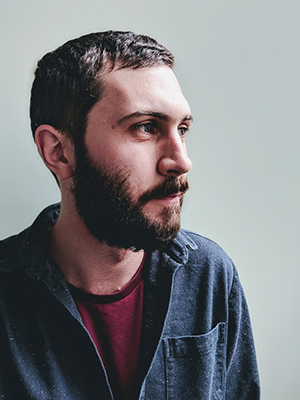The Personal and the Communal: Christopher Sanford Beck interviews Dominique Bernier-Cormier

Volunteer Christopher Sanford Beck talks with Dominique Bernier-Cormier, winner of our 2024 Open Season Poetry Award with "Anything Other Than Itself," featured in our spring issue #226. They discuss our circles of impact, constantly rediscovering language, and the universality of teenage (and human) experience.
Dominique Bernier-Cormier is a Québécois/Acadian poet. His work won The Fiddlehead’s Ralph Gustafson Prize in 2017 and Arc’s Poem of the Year Award in 2023, and has been a finalist for a National Magazine Award, CV2's Young Buck Poetry Prize, and the Montreal International Poetry Prize. His first book, Correspondent, was longlisted for the Raymond Souster Award in 2018. His second book, Entre Rive and Shore (Goose Lane, 2023), is a multilingual collection of poems, essays and translations that explore bilingualism and Acadian identity. He is a high school teacher in Vancouver, on the traditional and unceded territories of the xʷməθkʷəy̓əm, Sḵwx̱wú7mesh, and səlilwətaɬ.
Congratulations on winning the Open Season Award for Poetry! Not only do you have a number of writing awards and two published books, but you also work as a high school teacher. I’d love to hear a little bit about your writing practice and how you balance that with your teaching career. Do you have any tips for maintaining motivation and momentum?
Thanks! And thanks to the whole Malahat Review team. I know running a contest is a huge amount of work.
I try not to see my teaching job as an obstacle to my writing, although in some ways it is, like all jobs. But I’m lucky—as a language arts teacher, I get to be immersed in language all day; I get to think and talk about it. And even better, I get to talk about it with teenagers, who are always in the process of changing, inventing, and cracking open language. In our classroom, I try to model being curious and playful and awed and intentional about language, which is also a state that is conducive to writing poetry. But I don’t have a strict, regular writing practice—I never have—I just have to wait until the little awe-tank in me starts cracking and overflowing.
For motivation and momentum, I don’t have any wisdom, other than to say that for me, internal motivation—the constant rediscovering of language—has been much more beneficial to my writing practice than external motivation—prizes, awards, book sales.
One of the things that Open Season poetry judge Kayla Czaga touched on in her commendation was that your poem was a reminder to look for hope and joy while living in fraught times. As a high school teacher, hope for the future must cross your mind somewhat often. How does interacting with students influence your outlook on the future?
I’m sometimes pessimistic about the world that my students live in—about the technological and ideological forces that act on them—but my students themselves are always a source of hope. That being said, I don’t think being a teacher gives me any kind of special insight into the future. What it does, mostly, is allow me to see teenagers as individuals, rather than as a generation. When we take this generational perspective, we tend to notice negative trends. Kids are worse at reading, at writing, at focusing, at [insert any of your fears]. But when we see them as individuals, which we have to do as teachers, two things happen.
First, we notice that they’re not worse at things. For example, they’re not worse at writing (which you hear a lot). They’re just “worse” (and only slightly) at some aspects of writing that we’ve traditionally valued, like punctuation and formal voice. In other ways, they’re incredible: they read and convey tone extremely well, and they’re super agile and adaptable with new vocabulary.
Second, we start to notice the universality of teenage (and human) experience. Despite all the different tech and ideas and influences around them, they still love hearing a good story, more than almost anything else. They still want to go outside when it’s sunny. We realize that there’s this core of human experience that’s resistant to nefarious technological and ideological forces. And that’s hopeful.
In your poem, the speaker talks about feeling connected to the weather, as if the state of their white T-shirt is connected to the skies. We know that our circles of impact are wider than we expect them to be, but at the same time, our experiences are deeply personal. As a poet, how do you balance specificity and personal authenticity with communal experiences? Or are they as different as we think?
I like the phrase “circle of impact.” That’s what a metaphor does: it widens an object’s circle of impact. It’s an overreach. It connects two things that seem unconnected. A good metaphor should feel improbable and artificial, and at the same time inevitable and natural. From the improbable part you get the originality, the surprising strike of beauty, which I think is the personal authenticity you’re asking about. And from the inevitable, you get the recognition, the communal. A good metaphor should make you ask yourself: how can a connection so specific, so unique, so new to me, feel so communal, so shared, so familiar?
So I think poetry, and especially metaphors, force us to link the personal and communal, to consider how individual elements affect the system. Every time you create a metaphor, you create a new ecosystem, a whole chain of relationships. If a T-shirt is the sky, then stains are weather, and if stains are weather, then smears of eyeliner are storm clouds, and so on. An extended metaphor is a food chain, a rain cycle. And it’s the same with the poem: every word you change affects the whole. There’s this video about the time they introduced a few individual wolves in Yellowstone, and over a few years it created a chain reaction that healed the whole ecosystem of the park. On hopeful days, that’s how I see the relationship between personal moments and communal experiences in poetry.
One of the joys of reading this poem is the play of contrasts. You’ve intertwined temporality, immediacy, permanence, and memory. Within the first two lines we’re hit with a semi-abstract cultural memory—the rainy Pliocene—and then the personal, immediate contrast of “summer here.” Then there’s the rain and the fire, the white T-shirt and the black makeup, the smoke-choked skies and the clear skies. How does contrast help to illuminate the ideas this poem is wrestling with?
It's funny because I didn’t use these images to create contrast (although it does). When I write about a T-shirt of rain and a T-shirt of ash, I get there through the shared “T-shirtness.” I notice similarities much more easily than differences. I think: here are instances in my life when weather and clothing were intertwined. But you’re right: as a reader, it’s the contrast between ash and rain that stands out. I think the contrast, here, is a by-product of the metaphor. I’m more interested in the connection between things that appear separate (metaphor) than the separation between things that are in proximity (contrast).
I guess that’s a long way of saying that the poet doesn’t always know what they’re doing or how they’re doing it.
That eponymous line, “It’s tough to imagine anything as anything other than it is now, as anything other than itself” is so illustrative of the blinders we can put on when we look at ourselves, our communities, even broad socio-political structures. This line prods us towards self-reflection, especially given the shifting and juxtaposed realities in the poem. Do you see poetry as functioning in the personal/political spheres of meaning-making?
For me, the personal almost always comes first in the writing process. That feeling was first a personal feeling. I was sitting in my front yard in the sun, and I literally had trouble imagining, picturing, remembering rain. And then I recognized that this personal feeling also had political weight, that perhaps it was shared enough that it could become political; that its circle of impact was large enough to be political.
In that sense, the political is a by-product of the personal in the poem, in the same way that contrast is a by-product of metaphor. Another way to say that is that a line has to work on a personal level before it can work on a political level. The political line receives its weight, its power, from the personal, and particularly from an accumulation of personal moments (the same way that a political body receives its authority from many individuals). That line is representative of the poem’s concerns. “Universal,” “political” lines like that only work if the poem has already built up a foundation of specific, personal moments and images: Gothenerg, black lipstick, castle dust.
It’s always exciting for me to read a poem that makes me want to go outside and live life, and this poem certainly did that for me. (I don’t have any metal festivals on my itinerary right now, but maybe I should….) Are there any projects or adventures (outside of your writing practice or within it) that you’re really excited about these days?
Well, my days of metal festivals are long over. But I’m writing this from Ereceiras in Portugal, where I'm on spring break, so that’s pretty exciting! I’m starting a four-day hike on the coast tomorrow, which should be beautiful. Other than that, just trying to keep writing poems.

Christopher Sanford Beck









